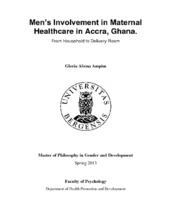Men's Involvement in Maternal healthcare in Accra, Ghana. From Household to Delivery Room
Master thesis
Permanent lenke
https://hdl.handle.net/1956/7325Utgivelsesdato
2013-05-31Metadata
Vis full innførselSamlinger
Sammendrag
Mid-way through working towards the Millennium Development Goal (MDG) five, which is concerned with improving maternal health, the international health community now realises that the goal is impossible to achieve without involving men as partners, fathers, husbands, brothers, policy makers and community and religious leaders" (UNFPA, 2007, para.3). Subsequently, there has been a call to educate men on the dynamics of women's health, especially during pregnancy, childbirth and the postpartum period so that they will give the necessary support. In Ghana, some district health directorates provide incentives to men who accompany their partners to the antenatal clinic by rewarding them financially (Kofoya-Tetteh, 27th Jan. 2012 p.20). Some NGOs and health facilities also organize pregnancy schools for couples to prepare them for the challenges of pregnancy, childbirth and parenting. Despite the growing interest in involving men, few studies have been conducted to explore what and how men support their partners during pregnancy and childbirth, and the factors which shape their support in specific contexts. This thesis is based on a qualitative study conducted with mothers, fathers and healthcare providers in Accra, Ghana to explore the factors that shape men's participation in maternal healthcare. The thesis draws on Connell's (1987; 1995) concepts of masculinities and femininities to explore how gender ideals, household and kin relations and healthcare practices shape men's contribution to maternal healthcare. The study highlights the alteration of dominant gender roles during pregnancy, the reasons which account for this change and social perceptions of the change. It also illustrates the significance of men's participation in antenatal, delivery and postnatal services and explores why most men are unable to participate. Moreover, the study demonstrates how two healthcare programmes; pregnancy school and the arrangement of serving women who attend clinics with their partners' first, could shape men's participation in maternal healthcare as well as alter and reproduce hegemonic masculine ideals. Keywords: men, maternal healthcare, antenatal, postnatal, pregnancy school, masculinities, femininities, equality.
